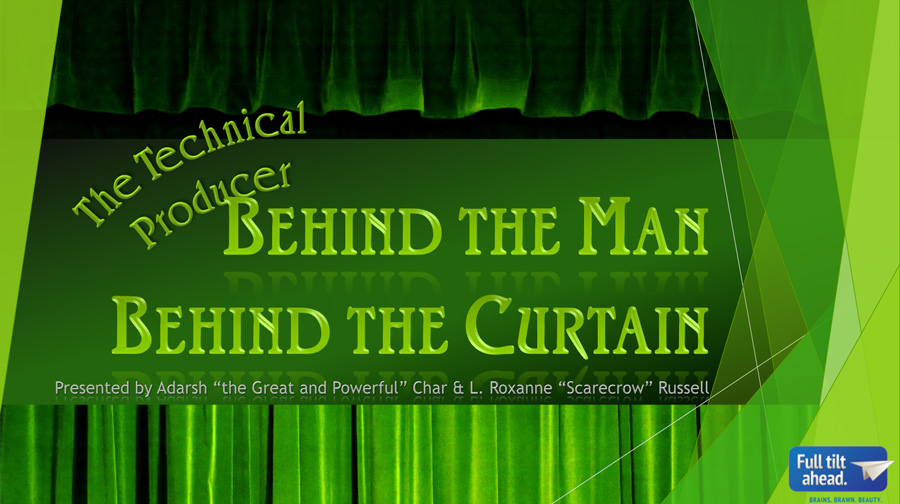Follow us on Twitter for real time updates.
Adarsh Char of Full Tilt Ahead is presenting “The Technical Producer Behind the Man Behind the Curtain”at the Online Learning Consortium’s 2014 International Conference
Abstract:
The eleventh annual survey by Allen and Seaman of the Babson Research Group shows that while Chief Academic Officers have grown increasingly more convinced (from below 50% in 2002 to over 70% in 2013) that online education is critical to the long-term strategy of their institution, 45% of them also agree that teaching online requires greater faculty effort and time than a traditional face-to-face course would.
It is not surprising that the greater emphasis placed on faculty to engage in online instruction is meeting some resistance. In particular, the same survey shows that academic leaders have fairly consistently indicated that learning outcomes have remained the same or have been somewhat superior or superior to traditional instruction. Yet faculty acceptance of online education has remained stagnant and is pointed to as one barrier to wide-spread acceptance.
Online education, like film and TV, continues to improve in the richness of the media that students expect. But faculty and administrators find that trying to match the community building and faculty presence of face-to-face education, what surveyed students find missing the most, is far more difficult online than walking into a traditional classroom. The technology to provide that complete experience, like web conferencing, exists but it is another ball for instructors to juggle when they should be focused on the lesson. Imagine an instructor starting up a synchronous session finding themselves troubleshooting audio and video challenges, merging communications, assigning students to breakout rooms, permitting entry into the classroom, all while not only trying to focus on and organize content but also build community while initiating the class.
This session will make a case for the role of a technical producer to facilitate the use of synchronous collaboration technologies so that educators participating in every model of online education can shift their focus to their area of expertise.
The Context
The capabilities of online learning environments have evolved from simple discussion boards to well designed, organizational reproductions of traditional face-to-face campuses. These environments support everything from content management systems that support digital rights management for the easy distribution of course materials to MOOCs that offer near-autonomous, prescriptive delivery of educational content for learners to step through at their own pace. Professional-grade tools such as WebEx, GoToMeeting, and Adobe Connect, along with tools more specifically developed for personal or educational use such as Google Hangout or Blackboard Collaborate have been used to offer more engaging and interactive learning.
However, study after study finds that it is not the technology that students have a problem with, it is the lack of a human experience. Repeatedly, anecdotal evidence backs up research data that indicates that the key disappointments students have with online learning environments include:
- The lack of a sense of community (Vonderwell, 2003)
- Isolation from faculty and other online learners (Woods, 2002)
- Delayed responses in comparison to what is expected in face-to-face discussions (Petrides, 2002)
This perceptions were again confirmed in Lee, Srinivasan, Trail, Lewis and Lopez’s study in 2011, in which they confirmed that perceived support was significantly related to their overall satisfaction in an online course. An earlier study by Song, Singleton, Hill and Koh (2004) indicated that among the scaffolds that improved students’ satisfaction with the course overall, that technical support was the primary component to create challenges for students in online learning environments. Muilenburg and Berge (2005) also noted that students with experience using online learning technologies perceived significantly fewer barriers to success than those who did not previously have experience in such environments.
While faculty have continued to build relationships with students and provide the necessary supports in terms of instructional support, they should not also be required to provide technical support – at least not simultaneously. The technical producer then, is a necessary addition to the scaffolding required to lift the responsibility of technical support from the instructor who, at the time of instruction, should be solely responsible for addressing instruction.
The Approach
To facilitate the implementation of the technical producer role into online learning, we will discuss:
- The roles and responsibilities of a technical producer
- Strategies for how to implement such a role – effectively and economically
- Address faculty dependencies and how to introduce and encourage greater familiarity and use with these tools for faculty to help minimize diversions during learning
- Recommend strategies for introducing faculty to the technical producer role as a part of faculty training
- Offer interactive lecture ideas for synchronous sessions
The Takeaways
In this session, we will offer approaches to provide faculty with the means to focus on building content and building relationships rather than managing synchronous sessions. We will share experiences and results from training programs that offloaded management of online sessions to a technical producer and provide feedback on audience experience and questions of implementation. Using a collaborative online learning tool, we will demonstrate how instructors can avoid technology distractions and focus on instruction. The audience will leave this session with ideas for how to implement more engaging synchronous using Thiagi’s interactive lecture ideas in an enhanced online classroom.
—
Adarsh Char is a creative, software product development and technology implementation leader in enterprise-class education and compliance solutions. An Ed Tech executive with over 22 years of experience in the field, Adarsh leveraged his cross-cultural and cross-border management strengths to help build a global assessment and special education compliance software company.
Adarsh continues to act as a leading consultant to education technology companies seeking guidance on operational approaches to product development, technology transition and solutions design.

